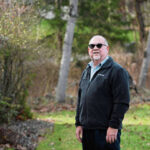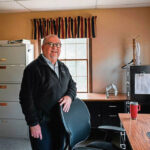After almost 12 years as the executive presbyter for the Redstone Presbytery, the Rev. Richard “Skip” Noftzger Jr. has retired.
The executive presbyter oversaw 65 Presbyterian churches in four counties.
Noftzger had been in ministry 28 years and in addition to administrative duties at two universities.
“I feel good about where we are (as a presbytery),” said Noftzger, 69, of Waynesburg, who served in the role from April 2013 to Dec. 31. “We have come through a lot of changes. We lived through … things like covid and the kind of changes and significant adaptations that have been required both by pastors and congregations.
“My role and our role in the presbytery was to assist in helping them make those changes.”
Noftzger said he had been thinking about retiring at the end of 2024. He informed Redstone Presbytery leaders last March he would be leaving Dec. 31, to give them time to conduct a search for his replacement.
When Redstone Presbytery was searching for an executive presbyter in 2012 to serve its churches in Westmoreland, Fayette, Cambria and Somerset counties, Noftzger said he thought his experience would fit well in the job.
Noftzger had been dean of students and a senior vice president at Waynesburg University, from 1986 to 2012. He also was a pastor at churches in the Washington Presbytery, which covers Washington and Greene counties, and was an interim pastor at a church in Peters Township.
“I thought I would be useful by being able to leverage or use all the kinds of previous experiences I had in terms of executive leadership in a university and pastoring churches of all sizes.
“In some ways, this position pulled those two things together,” Noftzger said.
The church position he landed plays both a profound and delicate role in the Presbyterian church, said the Rev. Martin Ankrum, pastor of First Presbyterian Church of Greensburg.
“Skip excelled in all aspects of this executive leadership and has left a profound mark upon the presbytery and our continuing work,” Ankrum said.
Among the changes and adaptions that Noftzger has dealt with has been the church’s struggle with whether to ordain gay and lesbian ministers and whether to permit same-sex marriages in the church.
Noftzger also has had to face the challenge of a presbytery with more churches than seminary-trained ministers, which is a problem shared by other mainline denominations.
The Rev. Sue Washburn credited Noftzger with his creative work in training ministers to address of the shortage of seminary-trained pastors. Noftzger was instrumental in setting up an Inter-Presbytery Leadership Formation organization that trains lay leaders to serve six Presbyterian presbyteries across Western Pennsylvania and parts of Ohio.
For its 65 churches, the presbytery has only about 40 seminary-trained ministers — and particularly ministers capable, able and willing to serve smaller congregations, Noftzger said.
It allows those serving in roles of church elders to get training and education in the ministry, so that presbyteries can feel comfortable in commissioning the trained person to serve a church, he said.
About 18 to 20 churches are served by the commissioned pastors, while in some instances a pastor serves multiple churches. Noftzger, himself, served as a commissioned pastor and was leading retreats, as a ruling elder while working at a college.
With an older demographic in Western Pennsylvania, the presbytery has fewer parishioners. There were about 12,500 12 years ago to between 9,500-to-10,000 in 2024, Noftzger said. Some of that membership loss can be attributed to the churches leaving the denomination, he said.
Noftzger’s qualities as a leaders were recognized by fellow ministers in the presbytery.
“Skip Noftzger provided insightful, thoughtful, and faithful leadership to the over 60 churches that comprise Redstone Presbytery,” Ankrum said. “Skip was always accessible to those in need of guidance, advice, or just some good theological discourse. And in the world of pastoral leadership, such conversations and relationships are not only important, they are vital.”
Noftzer has been the consummate professional in his role as executive presbyter and stated clerk for the presbytery, said Rev. Douglas Rehberg, interim pastor of the First Presbyterian Church of Irwin.
“He’s done it exceedingly well,” Rehberg said.
During his time as executive presbyter, Noftgzer has been able to develop relationships with the leaders of the churches in the presbytery, as well as those in the pews, Rehberg said. He has preached in the presbytery’s churches some 500 times, Rehberg said.
“He’s first class,” Rehberg said. “He’ll be very hard to replace.”
The first step in that replacement is hiring an interim executive presbyter, which the presbytery has done, Ankrum said. That person will begin in early February.
As for Noftzger, he doesn’t plan to stray far from what he has been doing all his life, when he felt in college that God was calling him into the seminary.
“At the time, I assumed I would be a pastor. I probably will do much of the same kinds of things — preaching, teaching, consulting — ministry strategy, organizational leadership, for churches and non-profits.”











